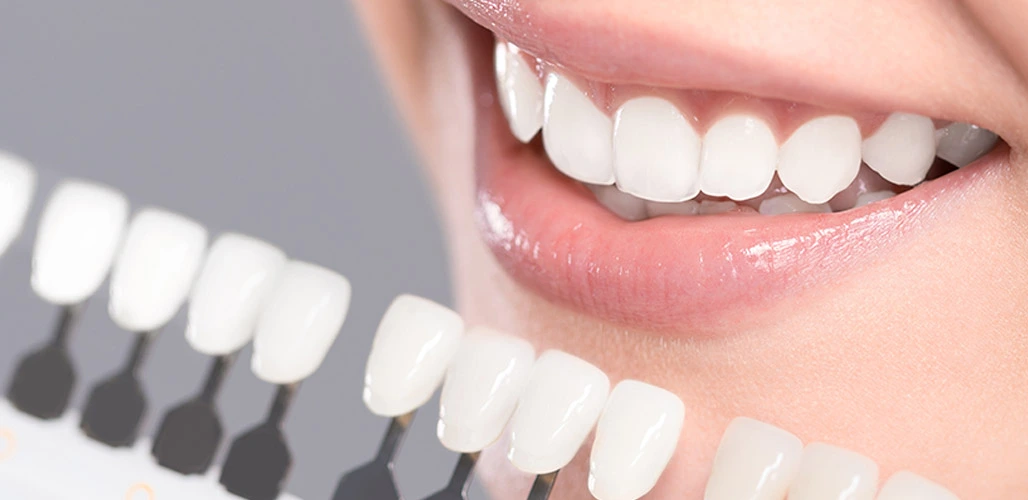Universal Dental Clinic Porcelain Veneers in Turkey

Porcelain Veneers: A Glance
| Question | Answer |
|---|---|
| Procedure time | Typically 2-3 visits spread over a few weeks. |
| Anesthesia type | Local anesthesia is used. |
| Pain | Minimal to none during the procedure, with possible temporary sensitivity afterward. |
| Why Turkey for porcelain veneers? | High-quality, cost-effective dental care with experienced dentists. |
| Worth it | Yes, for long-lasting aesthetic improvements. |
| Flying after surgery | Flying is generally safe shortly after the procedure. |
| Healing time | No significant healing time; adjustments to feel may take a few days. |
| Success rate | Above 90% success rate over 10 years. |
| Washing/Bath When? | No restrictions related to washing; oral hygiene maintenance is crucial. |
| Natural results? | Yes, they are customized for a natural look. |
| Suitable age | Adults of any age, primarily after full dental development. |
| Any risk | Risks are minimal but include increased sensitivity and potential for veneer detachment. |
| Any scar | No scars; the procedure is non-invasive. |
| Lifespan Time? | 10 to 15 years, with proper care potentially extending longer. |
What is a porcelain veneer? Porcelain crowns?
Porcelain veneers are thin shells of critical ceramic material that are bonded to the front of teeth for cosmetic enhancement. A porcelain crown is a personalized cap that goes all around a tooth, saving the tooth's shape, size, strength, and looks. Extensively applied in cosmetic dentistry, they serve as a widespread solution for those going for beautiful smiles. As far as Turkey is concerned, porcelain veneers are a grave issue, with Turkish dentists having a very high reputation and being specialists in this area.
When are porcelain veneers used?
Porcelain teeth are commonly used for:
- Porcelain veneer post-procedureorcelain veneer offers versatility in the field of cosmetic dentistry due to their coverage of different dental aesthetic issues.
- Overcoming acid-based teeth whitening-resistant stains.
- Temporary filling of chips or small fractures on teeth.
- Addressing the small differences between the teeth and making them look uniform.
- Adjustment of slight irregularities without braces.
- Enhancing the aesthetics of crooked or crowded teeth.
- Increasing the size of your tooth for your smile to be more harmonious.
- Saving besieged tooth enamel from any further deterioration.
- Creation of a superbly white and .
Pros and cons of porcelain veneers?
Some pros and cons of porcelain veneers are shown below.
Pros of porcelain veneers:
- Teeth become very white.
- Stain-resistant and lasting for up to 15 years.
- Designed to be in perfect harmony with your teeth.
- Has the benefit of sparing more tooth surface than crowns.
- Mostly performed in two visits.
- Porcelain does not get yellowish, unlike natural teeth.
- They do not often lead to gum irritation.
Cons of porcelain veneers:
- May be more pricey compared to other cosmetic procedures.
- Some might feel higher tooth sensitivity.
- If damaged, the veneers will need to be replaced.
- May alter the appearance of surrounding teeth with time.
- Being strong, they can become vulnerable under certain circumstances.
- Unsuitable for those who don’t possess healthy teeth and gums.
How to prepare for porcelain veneer treatment?
Before getting porcelain veneers, remember to discuss with your Turkish dentist what changes you want to make in your smile. Take care of your gum health and teeth; make sure that you take care of any existing issues first. You should find a dentist in Turkey who is a dental veneers expert. Understand how much it will cost and do not expect surprises. Remember that taking care of your porcelain teeth is essential to keeping them beautiful. Recall that veneers make your smile look excellent, but they should work for you as who you are.
Porcelain Veneer Procedure in Turkey
Porcelain veneer process steps are given below:
- Consultation: Consult a veneer teeth dentist to explain your aims and step through the dental veneer treatment process to consider your eligibility for veneers.
- Tooth Preparation: The Turkish dentist will drill a tiny pit of enamel for adhesive bonding, which makes the veneer sit flush on his/her tooth without becoming bulky.
- Dental Impressions: After tooth preparation, an impression is taken to make some models for custom veneers that will look like your natural teeth.
- Temporary Veneers: While permanent replacement is being made, you may be fitted with temporary veneers to shield your trimmed teeth from damage.
- Veneer Creation: The lab technician creates the veneer using the molds after the impressions are taken. This may take a few weeks.
- Fitting of Permanent Veneers: When permanent veneers are ready the dentist will remove the temporary veneers and then cut and trim them to fit your tooth, adjusting for the best fit.
- Dental Bonding: The composite resins are laid up on your teeth and then they are bonded to your teeth using a strong adhesive which is cured using light.
- Final Adjustments: Dentists in Turkey do all the required changes to match your bite ideally and make the new veneer and crown look as natural as possible.
What to do after the porcelain veneer procedure
You need only maintain your veneers just like your natural teeth, just make sure you brush and floss regularly. Don't forget to avoid having a chomp on hard items; if you can't handle the pressure save it for later. As long as you do not miss out on your dentist appointments for regular care and any eventual repairs then you should be fine. Plus, if something doesn't feel natural or you just have problems with it in your head, contacting a dentist immediately might be helpful.
Veneers Cost Comparison: Turkey, UK, and USA
| Location | Cost Range | Brief Explanation |
|---|---|---|
| Porcelain veneers Turkey price | $250 - $400/tooth | Porcelain veneers cost are affordable due to lower operational costs, making them a popular choice for dental tourists. |
| Porcelain veneers cost Uk | £400 - £1,000/tooth | In the UK, porcelain veneers come at a higher price due to stringent regulations and higher living expenses, with variations across clinics. |
| Porcelain veneer price in Europe | €400 - €800/tooth | Across Europe, the porcelain veneer cost varies, generally cheaper than in the UK but pricier than in Turkey, influenced by local economic conditions and the status of the clinic. |
Porcelain veneers Turkish packages typically include dental veneers, an initial consultation, and flight tickets/accommodation for international patients, making them very competitive for dental tourists. Customers in this structure not only get affordable teeth to veneer cost but also considerable savings compared to many other countries. The integration of standard dental care with the romance of traveling to another nation makes Turkey a popular destination for foreign patients who want to change their smiles.
Please contact Dr. Dt. Sharif Rzayev for your questions and current prices.
Are porcelain veneers worth it?
Yes, porcelain veneers are worth it. Porcelain veneers are worthwhile for those who wish to improve their smile because of their durability, wonderful traits, and the ability to correct different kinds of dental deficiencies. Porcelain veneers and crowns are the ultimate answer to permanent teeth discoloration, chips, and gaps they can make you smile brightly just as much as they can make you give special attention to self-esteem and oral health. Taking into account the fact that the treatment is conservation-oriented as well as that it is minimally invasive, dental veneers might be considered a great decision for those who wish to change the look of their smile dramatically.
How long do porcelain veneers last?
Porcelain veneers last up to 15 years or more with proper care. Preferring soft foods and regular dental visits will help them to keep you in excellent condition. Proper care can give them a longer life, and provide bling to your smile.
Why do people prefer Turkey for porcelain veneers and crowns?
Turkey today is a world center for porcelain crowns and veneer treatments because of its unique combination of well elaborate Turkish dentists and up-to-date clinics that provide these treatments at greatly lower prices compared to most Western countries. The medical tourism of the country is boosted by the appeal of merging medical treatment with the chance to experience the cultural heritage and natural beauty of the country. The all-inclusive packages including accommodation, transport, and translation seem too convenient and inexpensive for patients.
Are porcelain veneers painful?
No, unlike popular belief, getting porcelain veneers is not painful. Turkish dentists use local anesthesia to numb pain in the preparation and application processes. The sensitivity post-procedure is usually not more than mild and short-lasting to make the experience very comfortable.
Are Porcelain Veneers Safe in Turkey?
Yes, porcelain veneers in Turkey are regarded as safe. The safety factors include:
- Expertise of Turkish dental professionals
- High standards of dental clinic facilities
- Cutting-edge dental technology
- Modern dental practices
- Satisfactory outcomes for patients
Turkey has a reputation for quality dental care. The Turkish dental clinics are well-equipped and staffed by well-trained professionals. Lots of Turkish cosmetic dentists have international certifications and abundant experience in the field of dental veneers and crowns. Competitive prices do not affect the quality of care offered, therefore making it the right choice for dental tourism.
Porcelain Veneers vs Zirconia
Porcelain veneers are renowned for their strength of reproducing the natural translucency and the appearance of the tooth enamel, hence, the demand for them is quite high among people who wish to make cosmetic improvements to the front teeth. Zirconia, on the other hand, is very hard and resistant to abrasion, and that is why it is mainly the material of choice for crowns and bridges which face the most impact. As natural as porcelain is for cosmetic alterations, zirconia is also striking in its unsurpassable hardness and the fact that it is perfect for molars which are the teeth where chewing forces are highest.
Duration of Porcelain Veneer Treatment
The porcelain veneer treatment normally takes two to three appointments and it takes over 1 to 2 weeks. There is a consultation and preparation of the teeth in the first visit. Then, the manufacturer should receive the instructions and fabricate the veneers in the lab. These steps are done on the second visit.
Are Porcelain Veneers Comfortable?
Yes, porcelain veneers are comfortable that one gets used to as soon as they are placed. This type is specifically fitted tightly on your teeth by a dentist feeling natural despite your usual eating and speaking habits.
What are the most common myths about porcelain veneers?
A usual misunderstanding is that porcelain veneers do not require massive dental structure removal but, in fact, a minimal amount only is altered. The most common misconception is that veneers give an unnatural white and conspicuous grin. However, they are designed with a specific color and shape for your natural teeth to blend in fully. Another question is if veneers are meant to be used only for the front teeth or if they can be applied to any tooth that needs to be improved in its appearance.
What are the side effects of porcelain veneers?
People can experience a short-term decrease in tooth sensitivity shortly after they get porcelain veneers, including being sensitive to heat and cold, also known as the tooth-cutting procedure. That is the case only for a certain number of patients who happen to see their veneers peeling off or coming off their teeth. Therefore they have two choices which are to get the veneers reapplied by the dentist or replaced.
What is the success rate of porcelain veneers?
The success rate is over 90% after 10 years of placement. This is conditioned upon the correct use by the professional dentist and regular oral hygiene and care by the patient.
What should I ask a Turkish dentist before a porcelain veneer procedure?
- Could you present me your credentials in cosmetic dentistry, especially in porcelain veneers?
- Could you show me some before-and-after photos of patients who received the dental veneers?
- Could you please walk me through the main steps that are involved in veneer making?
- Will the composite be made according to the same color and shape of my teeth?
- What amount of tooth enamel should be removed for getting veneers?
- Which type of anesthesia, sedation, or any other stupor will be used during the procedure?
- How does the patient tolerate any reaction or sensitivity following the bonding of the veneer?
- So, What is the estimated lifespan of porcelain veneers with proper care?
- Do you offer pro-rata rates or bundled pricing for your services, including after-care?
- Would you please walk me through the risks and complications?
- How frequently do I need to come back for appointments and/or maintenance?
- What do I do if part of the veneer chips or comes out?
- Can veneers be renewed or innovated in the future if it’s necessary?
- What about my teeth brushing will change after I get veneers?
- What are your office statistics for porcelain veneer treatments?
Popular Treatments

Click for detailed information about dental implant operations.

Click to get detailed information about Hollywood Smile.

Click to get detailed information about Zirconium Veneer.

Click to get detailed information about Porcelain Veneer.

